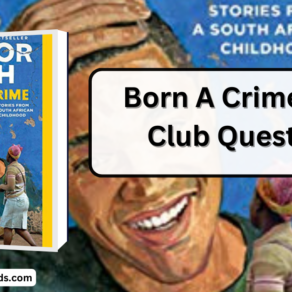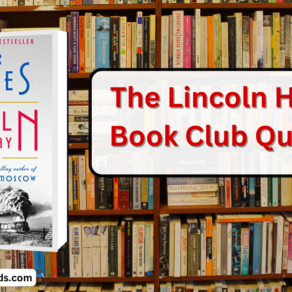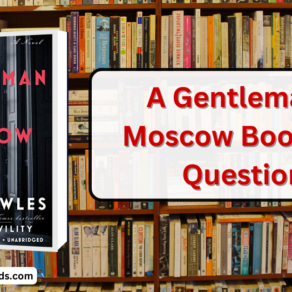Embarking on another chapter of our journey through Bonnie Garmus’ s compelling novel “Lessons in Chemistry,” we now turn our attention to a crucial aspect that can enrich any reading experience: book club discussions.
Having previously delved into various facets of this remarkable story in our series – from a comprehensive ‘Lessons in Chemistry’ summary, to an in-depth exploration of its characters, and a thoughtful examination of its most impactful quotes – it’s time to bring those elements together in a dynamic and engaging conversation.
Today’s post is dedicated to crafting thought-provoking book club questions for “Lessons in Chemistry.” These questions are designed not just to spark discussion but to deepen our understanding and appreciation of the novel. Before we dive into these questions, let’s quickly refresh our memories with the summary of the novel.
Lessons in Chemistry Summary
“Lessons in Chemistry” is a captivating novel set in the 1960s that follows the story of Elizabeth Zott, a brilliant and ambitious chemist. Due to societal expectations and gender roles, Elizabeth struggles to find her place in the male-dominated world of science. After being dismissed from her research position for insubordination, she unexpectedly becomes a single mother.
With few options, Elizabeth takes on a job as a TV cooking show host on “Supper at Six.” Despite her lack of culinary experience, she seizes the opportunity to combine her love for science and desire to challenge societal norms. Elizabeth uses the show as a platform to teach not just cooking, but also science and valuable life lessons to a captivated audience of housewives.
As the show gains popularity, Elizabeth becomes a trailblazer for women in science and an advocate for challenging traditional gender roles. Along the way, she forms meaningful relationships, navigates personal challenges, and inspires others to question the status quo.
“Lessons in Chemistry” is a heartwarming and witty exploration of gender expectations, personal growth, and the power of knowledge. It demonstrates the importance of challenging societal norms and serves as a reminder that everyone has the potential to make a meaningful impact in the world.
Lessons in Chemistry Book Club Questions
Here’s a comprehensive list of book club questions for “Lessons in Chemistry” offering a broad and enriching scope for discussion:
- Initial Impressions of Elizabeth Zott: What were your first thoughts about Elizabeth Zott? How did your view of her change as the story progressed?
- Author’s Use of Humor: How does Bonnie Garmus’ humor influence the tone and your enjoyment of the book? Can you recall moments that particularly amused you?
- Significance of the Title: Reflect on the title “Lessons in Chemistry.” How does it connect with the book’s themes and narrative?
- Gender Roles and Societal Expectations in the 1960s: Explore how the novel addresses gender roles and societal norms of the 1960s. What obstacles does Elizabeth confront and how does she deal with them?
- Impact of Relationships on Elizabeth’s Development: Consider the influence of Elizabeth’s relationships, like with her father or lab partner, on her growth and evolution.
- Stereotypes of Housewives and Mothers: Discuss how the novel challenges the stereotypes of the “ideal” housewife and mother. What commentary do you think Garmus is making?
- Metaphors of Food and Cooking: Analyze the use of food and cooking as metaphors. What do these metaphors reveal about characters and their interrelations?
- Influence of “Supper at Six”: What impact does the TV show “Supper at Six” have on the plot and on Elizabeth’s life?
- Ethical Dilemmas in Science: How does the novel address the ethical challenges in scientific research, and how do these issues relate to modern-day concerns?
- Ending of the Book: Share your thoughts on the book’s conclusion. Did it meet your expectations?
- Relatability and Personal Learnings: Which characters or story elements resonated with you the most? Did the book lead to any personal revelations?
- A Question for Bonnie Garmus: If you had the chance, what would you ask Bonnie Garmus about “Lessons in Chemistry”?
- Science and Feminism Intersection: How does the novel intertwine science and feminism? How does Elizabeth’s role as a chemist shape her feminist views?
- Effect of the 1960s Setting: How does the 1960s setting influence the story? How might Elizabeth’s story differ in a contemporary setting?
- Role of Minor Characters: Which minor characters were most impactful for you, and why? How do they contribute to the overall story?
- Symbolism in the Novel: What symbols or motifs did you notice, and how do they enhance the themes or character development?
- Scientific Metaphors: Discuss how scientific principles are used metaphorically. Do these enhance your understanding of the story or characters?
- Themes of Resilience and Challenges: How does Elizabeth’s handling of challenges reflect broader themes of resilience?
- Narrative Style and Structure: How does Garmus’ narrative style and structure affect your engagement with the story?
- Parenting and Family Dynamics: Discuss Elizabeth’s approach to parenting and family life. How does this reflect or challenge the norms of the era?
- Historical Context and Modern Relevance: How effectively does the novel capture the essence of the 1960s? Does it offer insights into current issues?
- Personal Reflections and Takeaways: What personal reflections or insights did the book provoke in you?
Final thoughts
In wrapping up our exploration of “Lessons in Chemistry” with these thoughtfully crafted book club questions, we’ve opened up a space for meaningful dialogue and deeper understanding. Each question is a opportunity to unraveling the layers of Bonnie Garmus’s novel, inviting us to reflect on its themes, characters, and the societal commentary it so brilliantly weaves.
As we ponder these questions, we not only engage with the narrative of Elizabeth Zott but also connect with the broader issues the book presents—gender roles, societal expectations, the intertwining of science and personal identity, and the power of resilience. This discussion is not just about dissecting a story; it’s an opportunity to reflect on our perspectives and experiences, both as individuals and as a society.
Whether you’re discussing “Lessons in Chemistry” in a book club, a classroom, or even in a casual conversation, these questions are designed to enrich your experience. They encourage us to look beyond the surface of the narrative and consider the profound messages hidden within.







